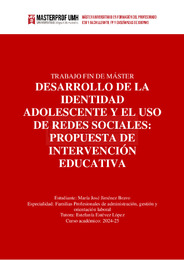Please use this identifier to cite or link to this item:
https://hdl.handle.net/11000/34087Full metadata record
| DC Field | Value | Language |
|---|---|---|
| dc.contributor.advisor | ESTÉVEZ, ESTEFANÍA | - |
| dc.contributor.author | Jiménez Bravo, María José | - |
| dc.date.accessioned | 2024-12-09T15:51:09Z | - |
| dc.date.available | 2024-12-09T15:51:09Z | - |
| dc.date.created | 2024-11 | - |
| dc.identifier.uri | https://hdl.handle.net/11000/34087 | - |
| dc.description | Especialidad: Familias profesionales de administración, gestión y orientación laboral | es_ES |
| dc.description.abstract | El trabajo aborda la influencia de las redes sociales y las relaciones de amistad en el desarrollo de la identidad adolescente y propone una intervención educativa para mejorar la convivencia escolar. El estudio analiza cómo las plataformas digitales afectan al bienestar emocional y social de los jóvenes que, al buscar validación social y compararse con ideales de éxito, experimentan diferentes fenómenos que se examinan como riesgos: ciberacoso, sobreexposición digital o problemas de salud mental. La intervención educativa se dirige a estudiantes de 4º de ESO, con el objetivo de fomentar un uso crítico y responsable de las redes sociales. Se propone un programa de seis sesiones que abordan temas como la autoestima, la presión social y la gestión del tiempo en redes. El estudio concluye que las redes sociales pueden generar tanto oportunidades como desafíos, y la educación puede ser clave para mitigar sus efectos negativos | es_ES |
| dc.description.abstract | This paper addresses the influence of social media and friendship relations on adolescent identity development and proposes an educational intervention to improve school coexistence. The study analyzes how digital platforms impact the emotional and social well-being of young people, who, in their search for social validation and comparison with ideals of success, encounter various phenomena that are examined as risks: cyberbullying, digital overexposure, or mental health issues. The educational intervention targets 4th-year secondary school students, aiming to promote a critical and responsible use of social media. A six-session program is proposed, covering topics such as self-esteem, social pressure, and time management on social media. The study concludes that social media can create both opportunities and challenges, and education can be key to mitigating its negative effects | es_ES |
| dc.format | application/pdf | es_ES |
| dc.format.extent | 43 | es_ES |
| dc.language.iso | spa | es_ES |
| dc.publisher | Universidad Miguel Hernández | es_ES |
| dc.rights | info:eu-repo/semantics/openAccess | es_ES |
| dc.rights | Attribution-NonCommercial-NoDerivatives 4.0 Internacional | * |
| dc.rights.uri | http://creativecommons.org/licenses/by-nc-nd/4.0/ | * |
| dc.subject | Adolescencia | es_ES |
| dc.subject | Convivencia escolar | es_ES |
| dc.subject | Redes sociales | es_ES |
| dc.subject | Bienestar emocional | es_ES |
| dc.subject | Ciberacoso | es_ES |
| dc.subject | FOMO | es_ES |
| dc.subject | Autoestima | es_ES |
| dc.subject.other | CDU::3 - Ciencias sociales::37 - Educación. Enseñanza. Formación. Tiempo libre | es_ES |
| dc.title | Desarrollo de la identidad adolescente y el uso de redes sociales: propuesta de intervención educativa | es_ES |
| dc.type | info:eu-repo/semantics/masterThesis | es_ES |

View/Open:
TFM Jiménez Bravo, María José.pdf
1,35 MB
Adobe PDF
Share:
.png)
